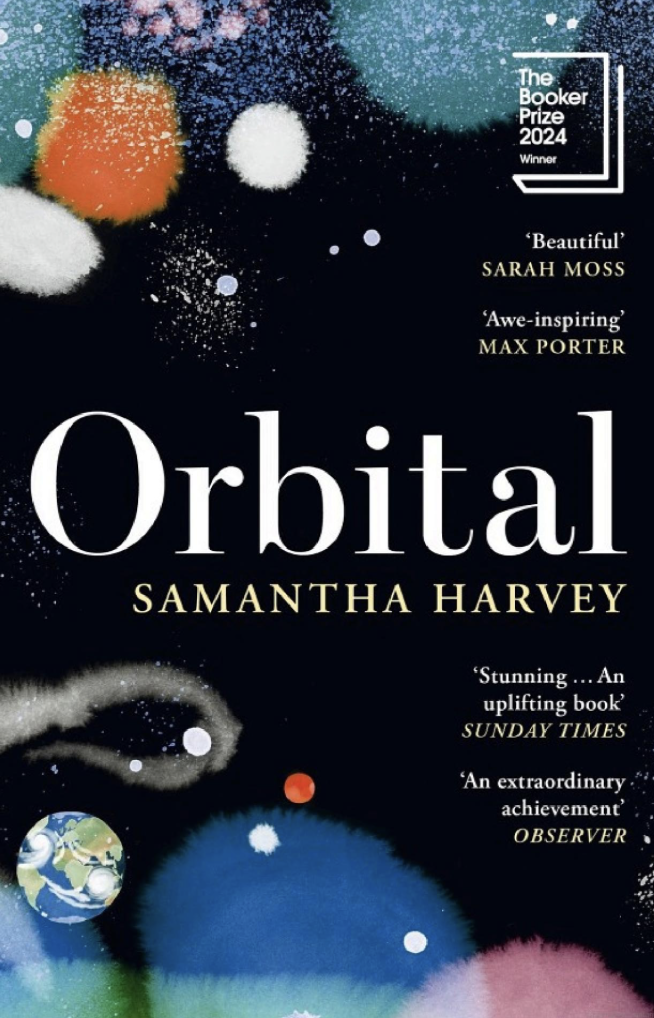‘Orbital’: 16 Loops Around the Planet
Orbital is a novel by British writer Samantha Harvey. It was first published in 2023.
Set aboard the International Space Station, the book accompanies six astronauts around the Earth in 16 loops, detailing their routines, memories, losses, and quiet pondering.
I read the novel as unfolding in in three interrelated registers:
the mundane: astronauts check data, feed mice, complete experiments, exercise, sleep, eat, clean.
the human: astronauts have desires and regrets, they hold friendships, remember family, grieve, and crack jokes together.
the planetary: astronauts ponder questions of perspective, position, and responsibility.
From space, Earth appears as both intimately familiar and radically strange. Harvey evokes its shifting surfaces: a typhoon gathering over the Pacific, the glowing clusters and filaments of lights which – at night only – reveal human existence, the outlines of seas, lakes, deserts, estuaries, forests, and clouds.
Now as they track south from eastern Russia diagonally across the Sea of Okhotsk, Japan appears in the mauve-grey sheen of mid-afternoon. Their pass intersects the narrow line of the Kuril islands that tread a worn-out path between Japan and Russia. In this indistinct light the islands seem to Chie [the Japanese astronaut aboard] to be a trail of drying footprints. Her country is a ghost haunting the water. Her country is a dream she remembers once having. (Orbit 1, intro Orbit 2).
Position and Perspective
One of the books central themes is perspective – how position shapes what can and cannot be seen. Harvey introduces this question through Shaun, an American astronaut, who recalls a high school art lesson about Velázquez’s Las Meninas. His teacher had explained that the painting is a study of perspective, reflection, and absence:
It’s a painting inside a panting (…) Velásquez, the artist, is in the painting, at his easel, painting a painting, and what he’s painting is the kind and queen, but they’re outside of the painting where we are, looking in, and the only way we know they’re there is because we can see their reflection in a mirror directly in front of us. (Orbit 1, ascending).
At the time, Shaun had barely cared. But in orbit, he finds himself drawn back to the lesson, prompted by a postcard his wife (then his teenage classmate) gave him, annotated with her notes.
He has that postcard in his crew quarters. This morning when he wakes up he finds himself starting at it, at all of the possibilities of subject and perspective that his wife wrote out on its reverse. (Orbit 1, ascending)
From this scene, Harvey weaves a meditation on how position – physical, emotional, and epistemic – shapes perspective. The astronauts look at Earth with awe, longing, boredom. Each gaze is filtered through personal, earthly attachments: a child growing up, a parent who has died, a homeland under storm. There is no neutral vantage point.
… we come to see that not only are we on the sidelines of the universe but that it’s a universe of sidelines, that there is no centre, just a giddy mass of waltzing things. (Orbit 4, ascending)
Harvey also accounts for questions of proximity and distance. Pietro, the Italian astronaut aboard – disappointed by his macaroni cheese lunch – contemplates how another space mission destined for the moon will look at Earth:
… is it necessarily the case that the further you get away from something the more perspective you have on it? It’s probably a childish thought, but he has an idea that if you could get far enough away from the Earth you’d be able to fully understand it – to see it with your own eyes as an object, a small blue dot, a cosmic and mysterious thing. Not to understand its mystery, but to understand that it’s mysterious (…) To see the solidity fall away from it. (Orbit 5, ascending)
In Orbital, to change position, to zoom in and to zoom out, means to change meaning.
Responsibility
Harvey describes how from space Earth appears whole and borderless, how distance simplifies. Yet, she also attends to how it removes immediacy, rendering human suffering and longing, past and on-going injustices, abstract.
For me, Harvey’s observations resonate with debates about the planetary in law and politics: What sensibilities does invoking the planetary make possible? And which ones does it foreclose? Harvey stages this tension through the astronauts’ reflections:
Can humans not find peace with one another? With the earth? It’s not a fond wish but a fretful demand (…) they hear the news and they’ve lived their lives and their hope does not make them naive. So what do they do? What action to take? And what use are words? They’re humans with a godly view and that’s the blessing and also the curse. (Orbit 7)
I appreciate how the book resists casting responsibility in heroic terms – in terms of planetary stewardship, engineered control and management. Orbital is not a book about saving the planet. Instead, it frames responsibility as an ethic of care, attention, maintenance, and solidarity. On the emplaced setting of the International Space Station, responsibility is enacted in small everyday gestures: cleaning, running experiments, and looking after each other. Harvey seems to suggest that these gestures can gain significance beyond their immediate enactments.
The Planetary
The core message that Orbital brings home is that anything planetary is at once deeply human and radically other. The planet is ‘not peripheral and it’s not the centre; it’s not everything and it’s not nothing, but it seems much more than something’ (Orbit 4, ascending).
Many thanks to Luis Eslava for recommending the book to me during a workshop on ‘Planning and Publics – On Sustaining Shared Futurities in a Planetary Era'. The workshop was held at at NYU-London in collaboration with LSE and Queen Mary in June 2025.

